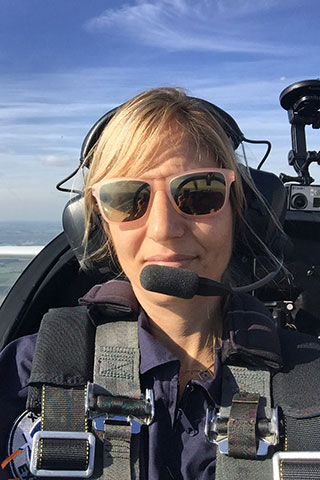When the time comes, psychologist Elisa Mallis, B.S. ’95, will be decked out in a space suit, carrying a picture of her husband and two sons with her, as she rockets upward at three times the speed of sound, above the Karman Line to the edge of space.
 For Mallis, the highlight of this brief voyage—60 minutes in all—will be the 15 minutes she’ll spend suspended in zero gravity, observing her home planet 340,000 feet below.
For Mallis, the highlight of this brief voyage—60 minutes in all—will be the 15 minutes she’ll spend suspended in zero gravity, observing her home planet 340,000 feet below.
Having lived on several continents during her 42 years, Mallis is used to shuttling between different worlds—and she has long used outer space as a metaphor in her work of helping the leaders of government and multinational organizations learn to thrive in an increasingly complex environment.
“For years I have used this perspective of looking at the Earth from space to help broaden our mindset and solve problems in a different way,” said Mallis, who is based in Beijing as head of executive development and coaching at Management Development Services.
Her training program, called “global mindset,” resonated with XCOR, a commercial space flight enterprise which has included her in its Founder Astronauts group, the first 100 individuals who will travel in their craft 103 kilometers above the Earth.
With their prototype “pretty much complete,” Mallis expects she could be ready for liftoff sometime in 2017, by which time XCOR engineers and pilots, its Pioneer group, will already have made test flights up to 60 kilometers.
“When we get to the point where passengers like me will be on the spacecraft, it will be safe—which is why we are currently waiting through such a rigorous testing and safety process,” she said, aware of the fatal crash in 2014 of the Richard Branson-backed Virgin Galactic test craft.
Training has included a flight simulator in Holland called Desdemona and an aerobatic ride in a Slingsby aircraft to simulate G-force acceleration and zero gravity. “All of that went very well so far,” she said.
Growing up, Mallis split her time between her native Miami and her parents’ native Greece. After majoring in psychology and biology at the University of Miami, she earned advanced degrees in organizational and counseling psychology at Columbia University. Her management consulting career has taken her to New York, London, Australia, and for almost a decade now Asia.
Mallis sees space as the next great hope to unlock creative solutions to our resource bind, like plans to capture solar energy from space. “We need to realize we’re one human race, and it’s going to be collaboration that will help us save ourselves and our precious planet,” she notes. “We should also be working toward broader possibilities for our long-term evolution. I believe we do have the potential to be more than a single-planet species.”
See Mallis training in the Mojave at youtube.com/watch?v=59bbbmfKFnc.
View a simulation of XCOR’s space flight at https://xcor.com/launch/the-space-flight/.
